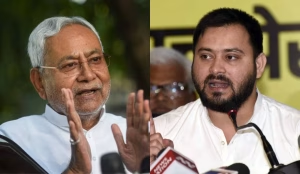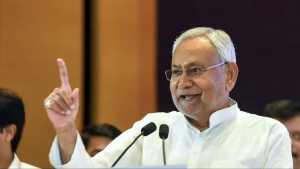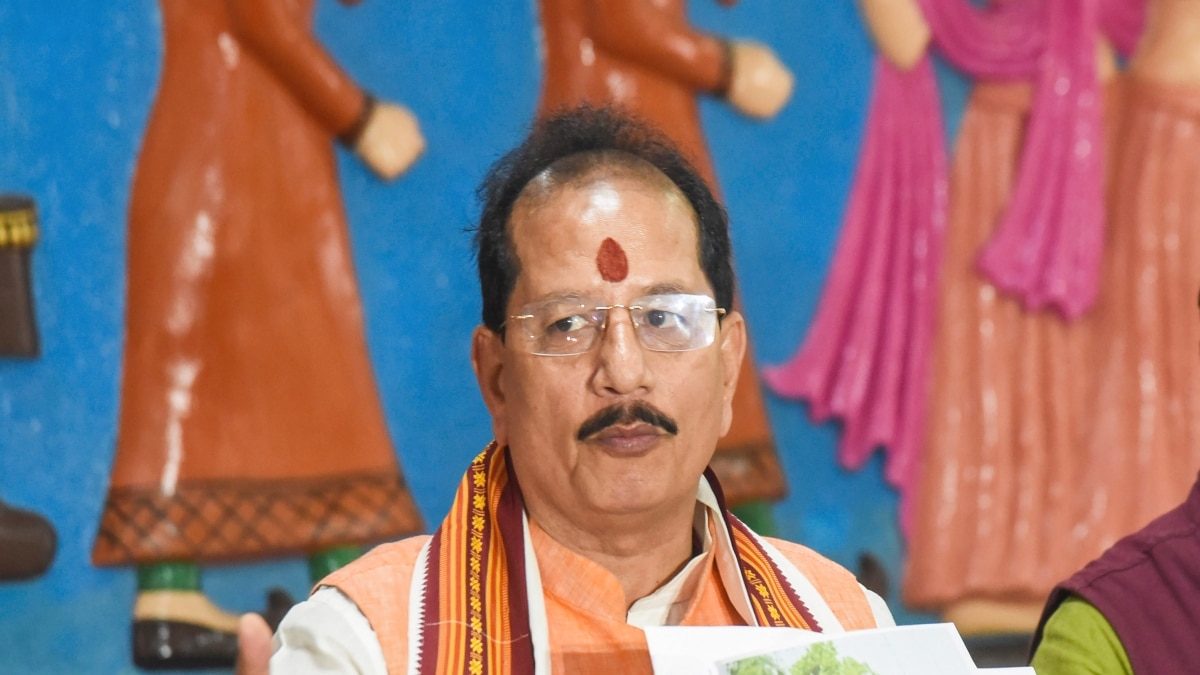Bihar – Former Bihar Deputy Chief Minister and Rashtriya Janata Dal leader Tejashwi Yadav has launched a scathing attack on Chief Minister Nitish Kumar, making serious allegations about the state’s governance and leadership. Tejashwi Yadav on Nitish Kumar statements have created significant political controversy, with the RJD leader claiming that the Chief Minister is “tired” and that corrupt retired officials are effectively running the Bihar government.
Serious Allegations About Mental Fitness and Administrative Control

Tejashwi Yadav on Nitish Kumar comments have raised serious questions about the Chief Minister’s capacity to govern effectively. The RJD leader has reiterated his previous charges regarding Kumar’s mental fitness, suggesting that the Chief Minister’s apparent fatigue has created a power vacuum that corrupt officials have exploited.
The Tejashwi Yadav on Nitish Kumar critique includes specific observations about the Chief Minister’s public behavior and apparent need for constant guidance from government officials. These allegations suggest that Kumar requires physical and verbal assistance during official functions, raising concerns about his ability to independently lead the state government.
Tejashwi Yadav on Nitish Kumar statements have highlighted incidents where officials reportedly had to hold the Chief Minister’s hand during public events and provide directions during ceremonial occasions. These specific examples form the foundation of broader allegations about administrative dysfunction in Bihar.
Also Read About The Revolutionary Delhi Govt Weekly Grievance Camps Launched
The detailed nature of Tejashwi Yadav on Nitish Kumar observations suggests systematic monitoring of the Chief Minister’s public appearances, with the RJD leader documenting instances that he believes demonstrate declining leadership capacity.
Evidence of Declining Leadership Capacity
Tejashwi Yadav on Nitish Kumar allegations include specific incidents that supposedly demonstrate the Chief Minister’s inability to function independently during public events. The RJD leader cited examples where Kumar allegedly required assistance from officials during the national anthem and other ceremonial occasions.
The Tejashwi Yadav on Nitish Kumar narrative includes claims that during events honoring Mahatma Gandhi, the Chief Minister was inappropriately applauding while others maintained respectful silence, requiring officials to intervene and correct his behavior.

These Tejashwi Yadav on Nitish Kumar observations extend to media interactions, with the RJD leader noting that Kumar rarely speaks directly to journalists and appears to rely heavily on government officials and the Deputy Chief Minister during public appearances.
Tejashwi Yadav on Nitish Kumar statements suggest that the Chief Minister’s public activities are carefully managed and limited in scope, with officials ensuring that he remains within a controlled environment near his official residence in Patna.
Limited Public Engagement and Photoshoot Politics
Tejashwi Yadav on Nitish Kumar criticism extends to the Chief Minister’s limited public engagement, particularly his alleged reluctance to visit incident sites or meet with victims of serious crimes. The RJD leader has questioned why Kumar doesn’t personally address important issues or hold regular press conferences.
The Tejashwi Yadav on Nitish Kumar narrative suggests that the Chief Minister only makes public appearances for “photoshoots” when opposition criticism becomes too intense, but even these appearances are carefully orchestrated within a limited geographic area.

Tejashwi Yadav on Nitish Kumar allegations include specific questions about why the Chief Minister doesn’t visit rape victims or personally investigate serious incidents that require high-level administrative attention and public reassurance.
The Tejashwi Yadav on Nitish Kumar critique implies that genuine public engagement has been replaced by managed media appearances designed to counter opposition criticism without requiring substantial personal involvement from the Chief Minister.
Retired Corrupt Officials Running Bihar Government
Tejashwi Yadav on Nitish Kumar allegations include serious claims about who actually controls the Bihar government in the Chief Minister’s absence. The RJD leader has specifically accused retired and corrupt officials of effectively running the state administration.
The Tejashwi Yadav on Nitish Kumar narrative includes specific examples, such as the Patna Medical College and Hospital Superintendent who allegedly received an extension after retirement despite corruption concerns. These examples suggest systematic appointment of questionable personnel to key positions.
Tejashwi Yadav on Nitish Kumar statements also reference a Chief Engineer who was reportedly caught with significant amounts of money but was merely retired rather than facing proper legal consequences. These examples illustrate broader patterns of administrative corruption and lack of accountability.
The Tejashwi Yadav on Nitish Kumar allegations suggest that these retired officials continue to wield significant influence over government decisions and policy implementation, effectively creating a shadow administration that operates without proper democratic oversight.
Law and Order Deterioration Under Current Administration
Tejashwi Yadav on Nitish Kumar statements include comparative analysis of crime statistics between different governmental periods. The RJD leader has challenged the characterization of the previous Mahagathbandhan government as promoting “jungle raj,” arguing that current crime data tells a different story.
The Tejashwi Yadav on Nitish Kumar argument suggests that objective analysis of crime statistics would reveal that law and order has actually deteriorated under the current administration, contradicting official narratives about improved governance and security.
Tejashwi Yadav on Nitish Kumar claims include assertions that criminal activities are “out of control” under the current government, despite official claims of improved law enforcement and public safety measures.
These Tejashwi Yadav on Nitish Kumar allegations directly challenge the government’s credibility on one of its key policy priorities, suggesting that public safety has declined rather than improved under Kumar’s leadership.
Deputy Chief Minister’s Controversial Actions
Tejashwi Yadav on Nitish Kumar criticism extends to the actions of Deputy Chief Minister Vijay Kumar Sinha, particularly regarding his handling of sensitive cases involving victims of serious crimes. The RJD leader has questioned the appropriateness of the Deputy CM’s approach to victim families.


The Tejashwi Yadav on Nitish Kumar narrative includes specific criticism of an incident where the Deputy Chief Minister allegedly asked a rape victim’s family to swear on their relatives to prove they were telling the truth about delayed medical treatment.
Tejashwi Yadav on Nitish Kumar statements suggest that this approach demonstrates insensitivity and inappropriate handling of serious criminal cases, particularly those involving vulnerable populations like Dalit girls and their families.
The Tejashwi Yadav on Nitish Kumar critique implies that such incidents reflect broader governmental attitudes toward victims and accountability, suggesting systematic problems in administrative approach to sensitive cases.
Media Silence and Democratic Accountability
Tejashwi Yadav on Nitish Kumar statements include criticism of media coverage, suggesting that important issues regarding governmental accountability are not receiving appropriate attention. The RJD leader has questioned why certain incidents and patterns of behavior are not subjects of broader public debate.
The Tejashwi Yadav on Nitish Kumar narrative suggests that democratic discourse has been compromised by inadequate media scrutiny of governmental actions and decisions, particularly regarding sensitive cases and administrative accountability.
These Tejashwi Yadav on Nitish Kumar allegations raise important questions about the role of media in maintaining democratic accountability and ensuring that governmental actions receive appropriate public scrutiny and debate.

